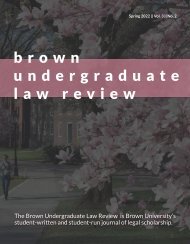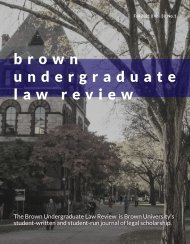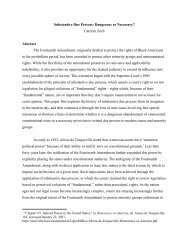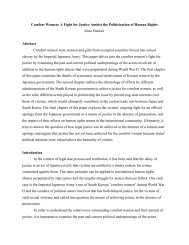Brown Undergraduate Law Review — Vol. 2 No. 2 (Spring 2021)
We are proud to present the Spring 2021 issue of the Brown Undergraduate Law Review. We hope that the works contained herein offer insight and inspiration to all who read them.
We are proud to present the Spring 2021 issue of the Brown Undergraduate Law Review. We hope that the works contained herein offer insight and inspiration to all who read them.
Create successful ePaper yourself
Turn your PDF publications into a flip-book with our unique Google optimized e-Paper software.
Standardizing Autonomy: Medical Communication, Liability, and the Doctrine of Informed Consent<br />
no treatment at all]?). 10 11 Departing from precedent, the<br />
appeals court determined that doctors cannot be legally<br />
entrusted with judging the scope of adequate disclosure;<br />
such discernment should be left to the courts. 12 Suggesting<br />
certain degree of ambiguity. The Canterbury court adopted<br />
the novel ?lens of reasonableness, rather than custom? to<br />
determine the materiality of a given risk, delineate<br />
physicians? duty to disclose, and assess the validity of<br />
that physicians may fail to align their professional informed consent claims. 16 17 However, assessing<br />
standards with patient interests, the appeals court declared,<br />
?Respect for the patient?s right of self-determination on<br />
particular therapy demands a standard set by law for<br />
physicians rather than one which physicians may or may<br />
not impose upon themselves.? 13<br />
reasonableness? let alone standardizing it? has proven a<br />
challenging science. After all, individuals? responses to,<br />
and interest in, the disclosure of specific risks may vary<br />
dramatically? posing the question: Is it possible to<br />
generalize the decision-making process of a mythical<br />
At the same time, not every doctor?s failure to inform<br />
?reasonable? patient? Even the Canterbury court<br />
could result in an informed consent claim. Besides<br />
demonstrating that their physician failed to disclose a<br />
procedure?s material risk, plaintiffs must also prove that a<br />
?reasonable patient [made aware of the risk] would more<br />
likely than not have opted not to undergo the procedure,?<br />
acknowledged the delicate task of applying the standard in<br />
practice, stating, ?There is no bright line separating the<br />
significant from the insignificant; the answer in any case<br />
must abide by a rule of reason.? 18<br />
Courts across the United States have since struggled to<br />
and that the undisclosed risk caused them to suffer a pinpoint the boundaries of reasonable disclosure.<br />
compensable injury. 14 Furthermore, according to Wisconsin?s state courts interpreted Canterbury to justify<br />
Canterbury, physicians are exempt from their duty to<br />
obtain informed consent in emergencies when the patient is<br />
the adoption of an unusually expansive disclosure doctrine,<br />
leading state physician groups to protest against the<br />
?unconscious or otherwise incapable of consenting,? as harmful impacts of defensive medicine. 19 While<br />
well as in situations where risk disclosure would threaten<br />
the patient?s well-being. 15<br />
Yet, the very notion of informed consent is imbued with a<br />
Canterbury has led some states to judge informed consent<br />
cases foremost according to the expectations of a<br />
reasonable patient? a standard that tends to favor plaintiffs<br />
10. Marc D. Ginsberg, ?Beyond Canterbury: Can Medicine and <strong>Law</strong> Agree about Informed Consent? And Does It Matter?? The Journal of <strong>Law</strong>,<br />
Medicine & Ethics 45, no.1 (March 2017): 109.<br />
11. Bobinski, 618.<br />
12.Canterbury, 464 F.2d 786. (?The duty to disclose, we have reasoned, arises from phenomena apart from medical custom and practice. The latter,<br />
we think, should no more establish the scope of the duty than its existence.?)<br />
13. Ibid., 464 F.2d 780, 784.<br />
14.Nadia N. Sawicki, ?Modernizing Informed Consent: Expanding the Boundaries of Materiality,? University of Illinois <strong>Law</strong> <strong>Review</strong>, (2016):, 8?9.<br />
15.Canterbury, 464 F.2d 788. (?Two exceptions to the general rule of disclosure have been noted by the courts. Each is in the nature of a physician?s<br />
privilege not to disclose, and the reasoning underlying them is appealing. Each, indeed, is but a recognition that, as important as is the patient?s right<br />
to know, it is greatly outweighed by the magnitudinous circumstances giving rise to the privilege? ?)<br />
16.Bobinski, 617.<br />
17. Canterbury, 464 F.2d 785. (?We hold that the standard measuring performance of that [duty to disclose] by physicians, as by others, is conduct<br />
which is reasonable under the circumstances.?)<br />
18.Canterbury v. Spence, 464 F.2d 787.<br />
19.Marc D. Ginsberg, ?Informed Consent and The Differential Diagnosis: How the <strong>Law</strong> Overestimates Patient Autonomy and Compromises Health<br />
Care,? Wayne <strong>Law</strong> <strong>Review</strong> 60 (2015): 371?72.<br />
<strong>Brown</strong> <strong>Undergraduate</strong> <strong>Law</strong> <strong>Review</strong><br />
34










